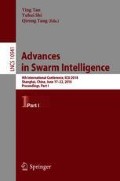Abstract
Population-based optimization algorithms adopt a regular network as topologies with one set of potential solutions, which may encounter the problem of premature convergence. In order to improve the performance of optimization techniques, this paper proposes a soft island model topology. The initial population is virtually separated into several subpopulations, and the connection between individuals from subpopulations is probabilistic. The workability of the proposed model was demonstrated through its implementation to the Particle Swarm Optimization and Differential Evolution algorithms and their modifications. Experiments were conducted on benchmark functions taken from the CEC’2017 competition. The best parameters for the new topology adaptation mechanism were found. Results verify the effectiveness of the population-based algorithms with the proposed model when compared with the same algorithms without the model. It was established that by applying this topology adaptation mechanism, the population-based algorithms are able to balance their exploitation and exploration abilities during the search process.
Access this chapter
Tax calculation will be finalised at checkout
Purchases are for personal use only
References
Eberhart, R., Shi, Y.: Computational Intelligence: Concepts to Implementations. Morgan Kaufmann, San Francisco (2007)
Kennedy, J., Eberhart, R.: Particle swarm optimization. In: IEEE International Conference on Neural networks, IV, pp. 1942–1948 (1995)
Storn, R., Price, K.: Differential evolution – a simple and efficient heuristic for global optimization over continuous spaces. J. Global Optim. 11(4), 341–359 (1997)
Ryzhikov, I., Brester, Ch., Semenkin, E.: A multi-objective approach with a restart meta-heuristic for the linear dynamical systems inverse mathematical problem. Int. J. Inf. Technol. Secur. 10(1), 93–102 (2018)
Awad, N.H., Ali, M.Z., Liang, J.J., Qu, B.Y., Suganthan, P.N.: Problem Definitions and Evaluation Criteria for the CEC 2017 Special Session and Competition on Single Objective Bound Constrained Real-Parameter Numerical Optimization. Technical Report, Nanyang Technological University, Singapore (2016)
Das, S., Mullick, S.S., Suganthan, P.N.: Recent advances in differential evolution - an updated survey. Swarm Evol. Comput. 27, 1–30 (2016)
Kennedy, J.: Bare bones particle swarms. In: IEEE Swarm Intelligence Symposium, pp. 80–87 (2003)
Li, X., Yao, X.: Cooperatively coevolving particle swarms for large scale optimization. IEEE Trans. Evol. Comput. 16(2), 210–224 (2012)
Xin, J., Chen, G., Hai, Y.: A particle swarm optimizer with multistage linearly-decreasing inertia weight. In: International Joint Conference on Computational Sciences and Optimization, vol. 1, pp. 505–508 (2009)
Li, H.R., Gao, Y.L.: Particle swarm optimization algorithm with exponent decreasing inertia weight and stochastic mutation. In: Second International Conference on Information and Computing Science, pp. 66–69 (2009)
Al-Hassan, W., Fayek, M.B., Shaheen, S.I.: PSOSA: an optimized particle swarm technique for solving the urban planning problem. In: International Conference on Computer Engineering and Systems, pp. 401–405 (2007)
Brest, J., Greiner, S., Bošković, B., Mernik, M., Žumer, V.: Self-adapting control parameters in differential evolution: a comparative study on numerical benchmark problems. IEEE Trans. Evol. Comput. 10(6), 646–657 (2006)
Zhang, J., Sanderson, A.C.: JADE: adaptive differential evolution with optional external archive. IEEE Trans. Evol. Comput. 13(5), 945–958 (2009)
Tanabe R., Fukunaga, A.: Success-history based parameter adaptation for differential evolution. In: IEEE Congress on Evolutionary Computation, pp. 71–78 (2013)
Tanabe, R., Fukunaga, A.: Improving the search performance of shade using linear population size reduction. In: IEEE Congress on Evolutionary Computation, pp. 1658–1665 (2014)
Acknowledgments
Research is performed with the support of the Ministry of Education and Science of the Russian Federation within State Assignment project № 2.1680.2017/ПЧ.
Author information
Authors and Affiliations
Corresponding author
Editor information
Editors and Affiliations
Rights and permissions
Copyright information
© 2018 Springer International Publishing AG, part of Springer Nature
About this paper
Cite this paper
Akhmedova, S., Stanovov, V., Semenkin, E. (2018). Soft Island Model for Population-Based Optimization Algorithms. In: Tan, Y., Shi, Y., Tang, Q. (eds) Advances in Swarm Intelligence. ICSI 2018. Lecture Notes in Computer Science(), vol 10941. Springer, Cham. https://doi.org/10.1007/978-3-319-93815-8_8
Download citation
DOI: https://doi.org/10.1007/978-3-319-93815-8_8
Published:
Publisher Name: Springer, Cham
Print ISBN: 978-3-319-93814-1
Online ISBN: 978-3-319-93815-8
eBook Packages: Computer ScienceComputer Science (R0)

